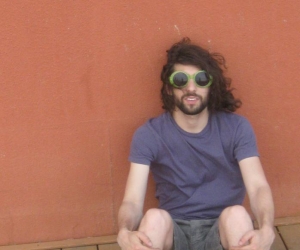
In early 2016 Ottawa-based DJ, producer, and dancer Eric Vani, aka Rise, was hired to create music to be played at the Canadian Museum of Nature’s Nature Nocturne—a themed-evening series that Vani describes as a “rave in the middle of dinosaur skeletons.”
“They hired me to remix a bunch of music from around the circumpolar—different circumpolar Indigenous nations, including Inuit,” he explains from his home in Ottawa.
Vani wanted the night to feature more than just remixed tracks. And who better to involve, he thought, than throat singer Charlotte Qamaniq? She was soon on board, as was Cynthia Pitsiulak, her vocal partner in the duo Silla. The instant chemistry between the three musicians led them to realize that what they were creating needed to be heard beyond the museum’s walls.
Their initial sound was “a bit like stumbling in the dark,” says Vani, comparing those early experimental days to the style of the 1980s outfit Enigma. He eventually lost interest in just running loops and tracks underneath Silla, and began transforming how he interacted with their singing.
“It evolved as it was being performed,” Vani explains. “I learned about the game of throat singing. It’s a rhythmic game that women play, analogous to a B-Girl battle. They’re constantly trying to throw each other off—there’s a lot of showing of strength and celebrating strength, especially female strength.” The practice is a primarily female artform, Qamaniq explained to me, although there are no rules preventing men from throat singing.
Silla’s vocal ferocity inspired Vani.
“I’m a percussionist, so I devised this method of performing all the sounds into one-shot samples. They’re individual percussive sounds. Each percussive sound is on my pads, and I can reproduce the sequence and rhythm live. I can control the tempo and dynamics completely with the music we initially created, decomposed into little bits. We’re able to create dynamic effects where we bring it up to crazy crescendos, and then it goes down to very, very quiet.
“Basically, they’ve let me play the game with them, which is an immense privilege because normally it’s just two women doing this. I get to remix with them live, on the fly.”
Qamaniq and Pitsiulak brought their traditional sound repertoire—such as the saw and mosquito—and traditional Inuit throat songs passed down through generations. They also enhanced or invented modern sounds. The process was improvisational, all three bringing forth ideas for hours, letting songs morph and drift from one place to another, the new energy guiding them into new sound spaces.
“The sounds that come out can be surprising and otherworldly,” Pitsiulak says. “We often describe it as ‘a little bit galactic.’ We even named one of the songs [on their upcoming album] ‘Galactic-gala.’”
“Adding gala to the end of a word in Inuktitut gives it the meaning that it’s ‘a little bit,’ Qamaniq adds. “So, the song is “a little bit galactic.” Galactic-gala is word play on the Inuit term kalattatta, a traditional Inuit song and dance.
Soon their self-titled debut album, Silla and Rise, was born. Even the trio couldn’t quite describe its sound, which is characterized by some as global dance-floor culture meets traditional Inuit throat singing, or as Inuit lounge music. “We joke around that we make intergalactic house music or alien hip-hop,” says Vani. The album made quiet waves, entrancing everyone who happened to come across it. In 2017, they received a Juno nomination for Indigenous Music Album of the Year. “Never in my wildest dreams did I think this could happen,” Pitsiulak says.
The path to being part of Silla and Rise has been different for all three members. Vani is of Italian and French-Canadian descent and grew up loving world music, particularly music from the African diaspora, and from Central, South, and Latin America. A 2010 chance meeting with Kevin Chief (aka Flying Down Thunder), as he skated down the Rideau River, introduced Vani to the Indigenous music of Canada. The two ended up collaborating on projects involving archival recordings, such as a Mohawk elder’s recordings, while also blending Kevin Chief’s traditional Algonquin music with Vani’s electronic beats. In 2012, their album One Nation received a Juno nomination for Aboriginal (now called Indigenous) Album of the Year.
In 2002, Qamaniq, who is also an actor, moved to Ottawa from Iglulik, Nunavut. The move inspired her to take up throat singing to bridge the emotional gap precipitated by the move. “Being separated from my culture and homelands, I felt the need to stay connected through the practice that was being revitalized after decades of suppression by the Canadian government and the church,” she says.
Like Qamaniq, Pitsiulak—who is from Kimmirut—found herself longing for the ancient expression that had been lovingly passed to her by her grandmother, who would throat sing to her. “I was too young to understand the significance of learning from her,” she admits. But in her midteens, Pitsiulak became enthralled with throat singing, and began learning by listening to CDs. After meeting Qamaniq, they soon became friends and collaborators, forming Silla (both also have other vocal partners they sing and tour with nationally and internationally). In 2007, they released their debut as Silla, Tumivut. “When we recorded Tumivut, we were just getting started, and although the feedback was good, some people back home said that our music sounded fabricated,” says Pitsiulak. Now, ten years later, Silla is receiving a vastly different reaction. “We have really grown into our own and found our style, and people are enjoying it.”
Qamaniq notes that some fans experience more than enjoyment when listening to them perform. “There always seems to be an audience member who approaches one of us in tears. It seems unexplainable, but we understand that this beautiful, primal, universal mix of sounds resonates so deeply within a person.”
Silla and Rise are working towards a sophomore album that is slated for a Fall 2019 release. They all tell me that fans will get to experience their so-called alien soundscapes on new and exciting levels, through the inclusion of Qamaniq’s poetry as well as featured guest performances. “The first album was really a studio creation,” Vani says. “This one is the result of us playing live together. It has depth. The songs are road tested. It’s a much more mature sound.”
Audio: Maujaraq—Snow Dub (2016) composed and performed by Silla and Rise.


